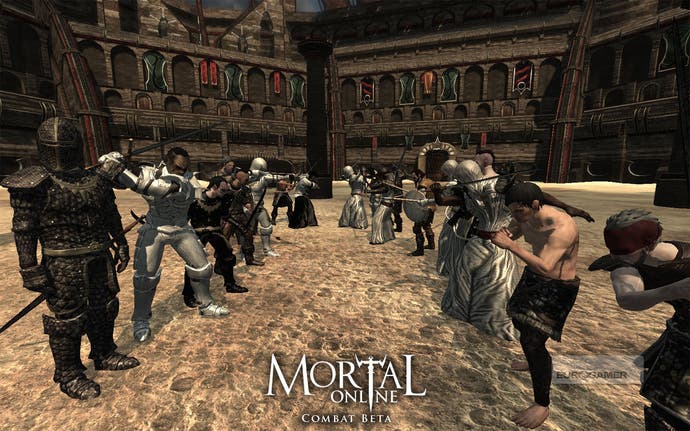Mortal Online
The eve of a new fantasy MMO.
A sandbox fantasy MMO seems an unlikely prospect in today's landscape. And it is. Nevertheless, Mortal Online has wandered over the horizon without a second glance at current trends. It's an open-ended fantasy MMO where player interaction - not PvE - is at the forefront, powered by Unreal 3, talking about the good old days. It's a strange sight.
To understand this oddity you have to look a little further back in the mists of MMO history and realise that it's an attempt to build on former glories. The main protagonist in this earlier epoch was called Ultima Online, which was the first of the great MMOs. It's still going today, albeit much diminished from its original finery. Unlike the lineage of online RPGs that followed EverQuest, including good old World Of Warcraft, the original vision of Ultima was to allow players to mess around in an open world. The idea was to give players various tools in this virtual world and see what they got up to. That meant few constraints on PvP, player-built housing, bits and pieces of clever emergent activity, and lots of crafting.
This was, for many gamers, a freedom the like of which they had seldom seen in any game, never mind a multiplayer one. It was, however, a slow, time-consuming experience, and unforgiving on solo players. MMOs are complex and time-hungry at the best of times, but UO demanded a different level of commitment, precisely because it modelled so much of the world. The Ultima design philosophy hasn't found much traction in MMOs that have followed, with only games like EVE Online, and now Mortal Online, stooping to pick up that heavy gauntlet.

Mortal, being developed by Swedish studio StarVault, is focused on creating an experience that lives up to the legacy of Ultima Online: returning to that philosophy of freedom and player co-operation while at the same time carving out its own niche with modern tech. Mortal Online is powered by the Unreal 3 engine - employing a new landscape engine to create an immense terrain - and is played with a first-person camera. While StarVault has evidently been galvanised by the Ultima way of doing things, its game has a look and feel of its own. You might be able to grind up resources like in UO, but exploring a 3D world is quite a different experience.
StarVault's community manager, Alexander Politz, is careful to balance expectations in his description of this synthesis of new and old: "A lot of our systems are following UO very closely. We had to bring them to the 'next gen' of course, and augmented them where we had to. Already a large part of our player base are what you would call UO-vets and we're getting very positive feedback from them. That does not mean that we are simply copying UO of course. There are a lot of things that make Mortal Online unique but yes, we like to think of our game as a spiritual successor to Ultima Online in some ways."

